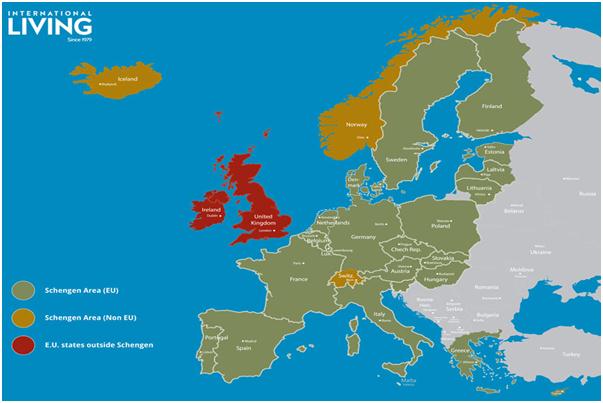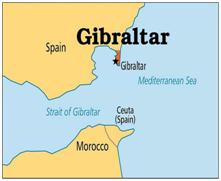‘Brexit: Gibraltar gets UK-Spain deal to keep open border’
- Posted By
10Pointer
- Categories
World Affairs
- Published
5th Jan, 2021
-
-
Context
Spain and the U.K. struck a last-minute deal over Gibraltar that eases access to the territory and removes the threat of fresh restrictions at the border with the European Union.
-
Background
- The Brexit trade dealbetween the EU and the UK did not cover Gibraltar.
- Instead the fate of the territory was the topic of months of parallel negotiations that focused on preserving free movement across the shared border with Spain while steering clear of the centuries-old sovereignty dispute between London and Madrid.
- With just hours left before the UK was to leave the 27-member bloc, Spain and the United Kingdom have reached a “preliminary agreement” to avoid the British Overseas Territory from becoming a hard border of the European Union.
- The UK-Spain deal marks a new chapter in the sometimes strained relationship between Spain and the U.K. over Gibraltar, the tiny strategic enclave at the entrance to the Mediterranean.
-
Analysis
Unlocking the ‘key’ to the deal
The key to the deal is that The Rock (Gibraltar), whose sovereignty is disputed by Spain and Britain.
- Free movement: Under the deal, Gibraltar will be part of the Schengen zone and follow EU rules, thus ensuring that a hard border does not separate it from the rest of Europe.
- Border control: During the “implementation period,” which will last for four years, these border controls will be headed up by the European border agency Frontex, but Spain will be responsible for the Schengen rules being observed in Gibraltar.
- That means that the European agents will have to render account to the Spanish authorities regarding who is permitted to enter the area and the policy of conceding visas.
- Travelling requirements: Anyone travelling to Gibraltar from Spanish territory will not require a passport, but British arrivals will, given that the United Kingdom is not part of the Schengen area.
|
Schengen area
- The Schengen passport-free zone consists of nations that have agreed to eliminate general travel checks among them.
- It is made up of 26 countries (22 from the EU, plus Norway, Switzerland, Iceland and Liechtenstein).
- The UK has never been a part of this zone.

|
-
Will Gibraltar get benefit from EU policies?
- Not only forming part of Schengen, Gibraltar will be able to benefit from EU policies, such as a customs regime for the trade of goods, always with the intermediation and support of Spain, and guaranteeing loyal competition in terms of taxation, environmental issues and work relations.
-
Does the deal address the issue of ‘sovereignty’?
- The deal does not address the thorny issue of sovereignty.
- Spain has long disputed British sovereignty over the Rock which was ceded to Britain in 1713 and which is now home to about 34,000 people.
- The Remain vote there was an overwhelming 96% in the 2016 EU referendum.
-
What is the status of Gibraltar?
- Officially remaining a British Overseas Territory, Gibraltar will now be part of the Schengen zone and follow EU rules.
- After the Spain-UK deal, free movement will now continue, as Gibraltar is being placed in the Schengen area, with Spain acting as a guarantor.
|
The country profile
- Gibraltar, with an area of just 6.8 sq km has a population of around 34,000 people.
- It is a peninsular having a land frontier with Spain and is situated at the south-western tip of Europe, guarding the entrance to the Mediterranean Sea from the Atlantic Ocean, with Morocco situated 14 miles away across the Straits of Gibraltar.

- Gibraltar fell into British hands after a war in 1713, and has since remained with Britain despite several attempts by Spain to retake it.
- Due to its strategic importance, Gibraltar came to be highly fortified by Britain since the 18th century, thus earning it’s commonly known name– “the Rock”.
- Even during World War II, Gibraltar’s port was critically important for the Allies, and it continues to be a key base for NATO.
- When Britain joined the EU in 1973, Gibraltar was a “crown colony”, but was reclassified as a British Overseas Territory in 2002.
- In two referendums, one in 1967 and the other in 2002, Gibraltarians overwhelmingly voted to remain a British territory.
- Currently, the territory is self-governing in all aspects, except for defence and foreign policy, which are managed by London, and Gibraltarians have British citizenship.
|
-
Why Gibraltar has been the ‘subject of dispute’?
- Gibraltar has been the subject of intense dispute between Spain and Britain for centuries.
- This is mainly because of its strategic location.
- The territory, which is connected to Spain by a small strip of land and surrounded by sea on three sides, serves as the only opening from the Atlantic Ocean into the Mediterranean Sea, making it a key location on the shortest sea route between Europe and Asia via the Suez Canal.
-
Why a ‘hard border’ was not favourable?
- The result of the 2016 Brexit referendum gave rise to the possibility of a hard border coming up between Gibraltar and the rest of Europe
- In the 2016 referendum, Gibraltar voted 96 percent being in favour of remaining in the EU.
- Gibraltarians mainly voted to ‘remain’ because the territory’s economy depends on an open border with Spain.
- Because of its small size, all food in Gibraltar is imported.
- More than 15,000 people live in Spain and work in Gibraltar, making up about 50 percent of its labor market.
- A hard border would have seen the end of many of these jobs in Gibraltar, as well as depriving the nearby Spanish population of customers with high spending power.
-
Wrapping Up
The deal is a good initiative, it is the best way to keep everything moving. Furthermore, the deal will lay the groundwork for a new relationship.